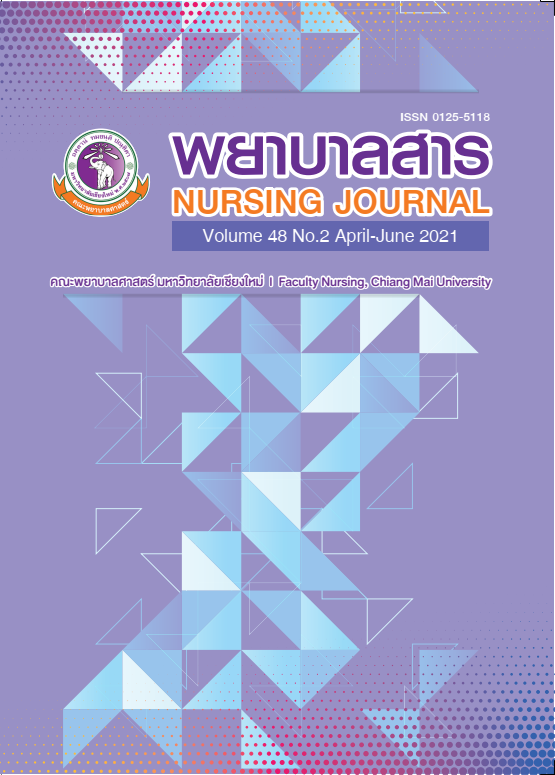Effect of Preparation for Discharge Readiness on Post-Discharge Coping Difficulties Among Caregivers of Older People with Stroke
Keywords:
Stroke, Caregiver, Preparation for discharge readiness, Coping difficultiesAbstract
Readiness of caregivers in caring for older people with stroke will decrease coping difficulties experienced while providing care at home. This quasi-experimental research, post-test only control group design aimed to examine the effect of preparation for discharge readiness on post-discharge coping difficulties among caregivers of older people with stroke. The sample consisted of fifty family caregivers of stroke patients aged sixty years old and above and hospitalized at Samutprakarn Hospital. The participants were recruited by purposive sampling and assigned into the experimental group or the control group, 24 and 26 participants, respectively. The experimental group received the preparation for discharge readiness program whereas the control group received the regular care. Research instruments consisted of the preparation for discharge readiness plan and the post-discharge coping difficulties scale. Data were analyzed using descriptive statistics and independent t-test.
Research results revealed that the experimental group had a moderate coping difficulty score ( =51.75, S.D.=15.35). Following discharge, the experimental group had significantly lower post-discharge coping difficulty than the control group at a significant level of p < .001.
The result of this study indicates that the preparation for discharge readiness program can reduce the coping difficulties of caregivers in caring for older people with stroke. Therefore, it can be used to prepare family caregivers of older people with stroke during hospitalization.
References
http://www.strokeassociation.org/STROKEORG/AboutStroke/AboutStroke_UCM_308529_SubHomePage.jsp.
Bastable, S. B. (2014). Nurse as educator principles of teaching and learning for nursing practice
(4th ed.). Massachusetts: Jones & Bartlett.
Chen, Y., Zhang, J., & Bai, J. (2016). Effect of an educational intervention on parental readiness for premature infant discharge from the neonatal intensive care units. Journal of Advanced Nursing, 72(1), 135-146.
Division of non-communicable diseases. (2019). Guide to screening and evaluating the elderly.
Bangkok: The Office of Veterans Affairs. (In Thai)
Efi, P., Fani, K., Eleni, T., Stylianos, K., Vassilios, K., Konstantinos, B., ... & Kyriaki, M. (2017).
Quality of life and psychological distress of caregivers’ of stroke people. Acta Neurologica Taiwanica, 26(4), 154-66.
Elsehry, N. K. M., Fouda, L. M., & Shawkey, E. A. (2019). The effect of an educational program on
the elderly with stroke and their family caregivers based on transitional care model. International Journal of Novel Research in Healthcare and Nursing, 6(1), 765-785.
Hekmatpou, D., Baghban, E. M., & Dehkordi, L. M. (2019). The effect of patient care education on burden of care and the quality of life of caregivers of stroke patients. Journal of multidisciplinary healthcare, 12, 211-217.
Knier, S., Stichler, J. F., Ferber, L., & Catterall, K. (2015). Patients’ perceptions of the quality of discharge teaching and readiness for discharge. Rehabilitation Nursing, 40(1), 30-39.
Moonthee, M., Monkongv, S., Sirapo-ngam, S., & Leelacharas, S. (2016). Impact of transitional
care programme and family caregivers on stroke patients’ routine activity performance,
complications, and satisfaction. Thai Journal of Nursing Council, 31(1) 95-110. (In Thai)
Oliva-Moreno, J., Peña-Longobardo, L. M., Mar, J., Masjuan, J., Soulard, S., Gonzalez-Rojas, N., ...
& Alvarez-Sabín, J. (2018). Determinants of informal care, burden, and risk of burnout in caregivers of stroke survivors: the CONOCES study. Stroke, 49(1), 140-146.
Panuthai, S. (2014a). Readiness for Hospital Discharge Scale: RHD-Parent Form (version Thai).
Faculty of Nursing, Chiang Mai University. (In Thai)
Panuthai, S. (2014b). Quality of Discharge Teaching- Caregiver Form (version Thai). Faculty of
Nursing, Chiang Mai University. (In Thai)
Panuthai, S. (2017). The Post Discharge Coping Difficulties Scale – Parent (version Thai). Faculty of
Nursing, Chiang Mai University. (In Thai)
Rafsten, L., Danielsson, A., & Sunnerhagen, K. S. (2018). Anxiety after stroke: A systematic review
and meta-analysis. Journal of rehabilitation medicine, 50(9), 769-778.
Sasat S. (2011). Nursing care for the elderly, common problems and guidelines for care. Bangkok:
Active Print. (In Thai)
Sennfalt, S., Norrving, B., Petersson, J., & Ullberg, T. (2019). Long-term survival and function after
stroke: A longitudinal observational study from the Swedish Stroke Register. Stroke, 50(1), 53-61.
Tseung, V., Jaglal, S. B., Salbach, N. M., & Cameron, J. I. (2019). Implementing caregiver support
programs in a regional stroke system. Stroke, 50(12), 3585-3591.
Weiss, M. E., & Piacentine, L. B. (2006). Psychometric properties of the readiness for hospital discharge scale. Journal of Nursing Measurement, 14(3), 163-180.
Weiss, M., Bobay, K., Bahr, S., Costa, L., Hughes, R., & Holland, D. (2015). A model for hospital discharge preparation. The Journal of Nursing Administration, 45(12), 606-614.
Weiss, M. E., Sawin, K. J., Gralton, K., Johnson, N., Klingbeil, C., Lerret, S., ... & Schiffman, R. (2017). Discharge teaching, readiness for discharge, and post-discharge outcomes in parents of hospitalized children. Journal of Pediatric Nursing, 34, 58-64.
World Stroke Organization. (2019). Global Stroke Fact Sheet 2019. Retrieved from https://www.world-stroke.org/assets/downloads/WSO_Fact-sheet_15.01.2020.pdf
Downloads
Published
How to Cite
Issue
Section
License
บทความที่ได้รับการตีพิมพ์เป็นลิขสิทธิ์ของวารสารพยาบาลสาร
ข้อความที่ปรากฏในบทความแต่ละเรื่องในวารสารวิชาการเล่มนี้เป็นความคิดเห็นส่วนตัวของผู้เขียนแต่ละท่านไม่เกี่ยวข้องกับมหาวิทยาลัยเชียงใหม่ และคณาจารย์ท่านอื่นๆในมหาวิทยาลัยฯ แต่อย่างใด ความรับผิดชอบองค์ประกอบทั้งหมดของบทความแต่ละเรื่องเป็นของผู้เขียนแต่ละท่าน หากมีความผิดพลาดใด ๆ ผู้เขียนแต่ละท่านจะรับผิดชอบบทความของตนเองแต่ผู้เดียว






